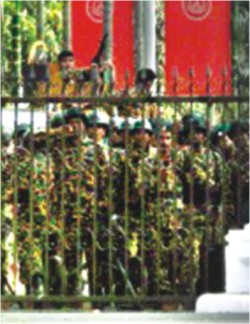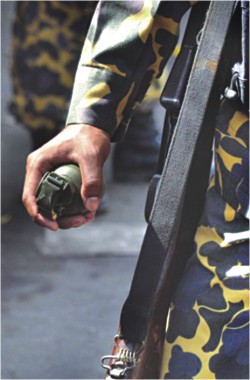|
||||
Education in a competitive world -- Dr S.M.A. Faiz Higher education deficits in a drift -- Abdul Mannan Education for All-Beyond business as usual -- Rasheda K. Choudhury Islamic education heritage -- Dr A.M. Choudhury Economic diplomacy: Awaiting thrust -- Muhammad Zamir A wake-up call -- S. M. Rashed Ahmed Chowdhury New opportunities: New Challenges -- Syed Muazzem Ali Foreign relations: Taking a direction -- Ashfaqur Rahman Indo-Bangla ties: Old shadow, new vista -- C M Shafi Sami Towards a kinder, gentler peacekeeping -- Tazreena Sajjad Independence of the Higher Judiciary -- Asif Nazrul Problems of delay and backlog cases -- Dr. M. Shah Alam Juggling freedom and responsibility -- Shahid Alam Tourism in Bangladesh -- G. M. Quader MP The industrial policy dilemma -- Zahid Hussain 'Consumer redress' and 'empty pocket blues' -- Tureen Afroz How assertive has the Election Commission been? -- Manzoor Hasan Does the Election Commission exercise all its powers? --Mohammad Abu Hena Adivasi's tears and grief -- Sareeta Haider Architecture: How Green is Green? -- Ar. Zebun Nasreen Ahmed Chittagong Hill Tracts: Development without peace -- Naeem Mohaiemen Revisiting the BDR saga -- Brig Gen Shahedul Anam Khan ndc, psc, (Retd) Sexual harassment and our morals police -- Hana Shams Ahmed Garnering efforts is a sign of growing up -- Dr. Nizamuddin Ahmed Rationalising the Intelligence services -- Muhammad Nurul Huda
|
||||
Revisiting the BDR saga Brig Gen Shahedul Anam Khan ndc, psc, (Retd)
IT is one year since the BDR tragedy. The word 'tragedy' doesn't adequately describe the events of 25th February 2009, when a deliberate and well planned carnage was carried out over a period of more than 24 hours. And to describe the event as mutiny would amount to sanctifying murder, because, even rebels follow a set of rules; here no holds were barred and, reportedly, even some of the families were subjected to most cruel treatment. Neither was the killings 'spontaneous outburst' of 'long-neglected' grievances. No person, more so men in uniform, except an animal, could have shed blood of his superiors to have their demands met. No government and that too only in office for less than a month, could have wished for a worse situation to tackle. The two questions that still linger in public mind, and will perhaps continue to do, till the masterminds behind the carnage are exposed, are the handling of the situation during the event and tackling the aftermath of the massacre. As of now, the two of the three inquiry commissions have completed their tasks. Of one, conducted by the AHQ, we do not have any idea about its findings and recommendations. And perhaps that is just as it should be. Military enquiries into matters such as this, in most cases, has not so much to do with seeking out the unknown and determining why a particular incident happened as much as fulfilling different administrative requirement. It is for the other committees to find out the 'who' and the 'why'. One of the other two enquiry / investigation committees has submitted its findings to the government. Its task is incomplete to my mind because many concerned persons, particularly a few in the decision making positions at that time were not made to present their views and opinions of the matter to the commission, and explain why they took the decisions that they did during the 48-hiour long episode. But the police investigation which is expected to find out the 'who' is still on and we do not as yet have any idea about the progress of the investigation. One would hope that the CID investigation would be able to identify the brain behind the killings and those who were pulling the strings from behind, because surely the BDR jawans, whatever the degree of their grievances might have been, would not have resorted to such an act on their own. It is indeed difficult to revisit the matter without re-examining the very core issue of it, which is was enough done in time to save the lives of the officers and their families, what else, if anything could have been done to prevent the massacre, and could there have been any other way of bringing the rebellion to a conclusion without loss of innocent lives. These are questions no one can provide answers to with any degree of sureness. And for every explanation there is bound to be a counter. As an analyst I am in a very happy and comfortable position of the benefit of hindsight. That is something not afforded to the decision makers and commanders on the spot facing a situation as horrific as that of 25th Feb 2009. And thus one finds it safe to rationalise a particular course of action or disapprove of another, knowing fully that it would involve neither lives nor time. The government had come under the most severe criticism for deciding to abstain from using force to quell the situation, justifying the action on the argument that force would have begotten force, and given the built up are around the BDR complex and the large number of civil population in and around Peelkhana, the possibility of loss of innocent lives was very high if surrender of the rebels was sought through force. This is an argument that is difficult to counter. However, there is just one thought that one cannot help inject at this point. What might have happened in case of use of force remains a conjecture since force was discarded as an option, but consequence for not exercising it, many feel, has been the cruel death of 57 very good officers. It will be for posterity perhaps, with detachment of space and time, to determine with some degree of exactness what the most appropriate action could have been.
At this point in time the two things that the people are waiting eagerly to see happen is a fair trial of the accused, and reorganisation of the force to bring it fully operational as quickly as possible. As for the trial, while justice should not be delayed, hurried actions may dilute the cause of justice. And the worry stems from the fact that although trial has commenced basing on the findings of the internal investigation of the BDR, there may be lacunae in the charge sheets since the main investigation, being conducted by the CID, is yet to be completed. Another issue that people have not got any reasonable explanation about is the large number of deaths of BDR jawans under custody. Death in custody during investigation will always raise doubts, and no explanation, however reasonable, will wash with the public. While meting out punishment one's conscience must be clear that no single innocent is punished. Reorganisation of the BDR can brook no further delay. It is a service whose importance and relevance are most strongly felt by the people living along the border. It is worth repeating that reorganisation of a force is a constant process and is an indispensable part of any organisation that wants to retain its dynamism and be in keeping with the changing environment within which it operates. As it is, remodelling of the border force was a pressing need that the government should have addressed of its own volition long ago. Although the matter is not public what one understands from information gleaned from various sources is that apart from the enhancing the size of the force the command structure will also be decentralised and there is provision for induction of officers from services other than the army. But whatever way the force is officered in future, one should not lose sight of the very important fact that the secondary role of the force is to beef up the army in tactical ground role during hostility, and peacetime orientation must focus on that. What happened with BDR on 25 February 2009 was enough for any other force to have collapsed as an institution. That it continued with its task without seriously stumbling speaks of the quality of those entrusted the responsibility of command of the BDR in the aftermath of 25 February. One is confident that the force will emerge with even more glorifying colures in the future. The Author is Editor, Defence & Strategic Affairs, The Daily Star. |
||||
© thedailystar.net, 2010. All Rights Reserved |


